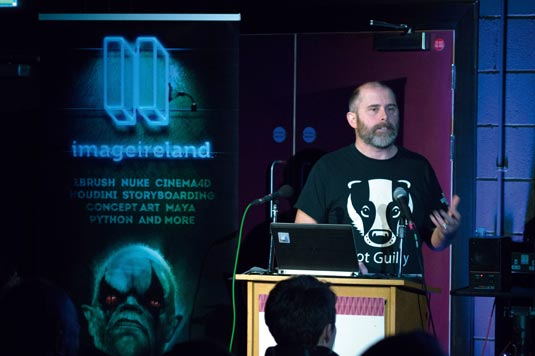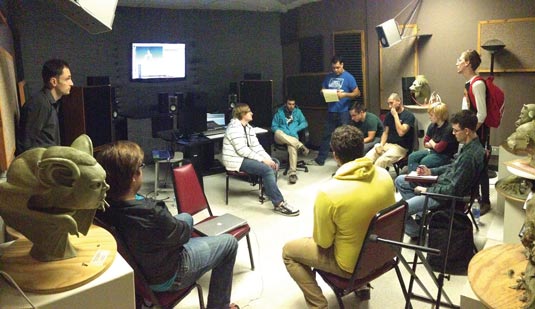How to land your dream job in VFX
Should you attend university or spend the money on online training? Alice Pattillo asks the experts for their opinions.
Sign up to Creative Bloq's daily newsletter, which brings you the latest news and inspiration from the worlds of art, design and technology.
You are now subscribed
Your newsletter sign-up was successful
Want to add more newsletters?
These days there are myriad formal and informal options to choose from when it comes to education: live courses, short practical courses, online only courses and full-time traditional three-year degrees.
Each promise to provide the skillset to land that dream job. It's difficult to know which will fulfil your expectations and what's going to suit your particular way of learning.
We chased down some of the leading tutors and industry professionals to give you an idea of what to expect from each form of teaching and decide the best option for you.
Vocational approach
Stephen Lohan has been very vocal with regards to his opinions on what method of training works best. As CEO and founder of Image Ireland, he is passionate about helping the next generation of VFX masters achieve their goals.
"I would recommend a more vocational approach to training," he says. "I think the courses should be short and intensive."

His own courses only include six students in a studio at any one time, giving one-to-one practical advice and attention to pupil's needs.
Online courses
But what about online courses?
Sign up to Creative Bloq's daily newsletter, which brings you the latest news and inspiration from the worlds of art, design and technology.
There are many advantages to learning online, argues Kyle Green at Digital-Tutors, including: "low cost to access, on-demand learning for both new skills and problem solving, learning direct from professionals in the industry about relevant skills, and you get to set your own schedule for content and pace."

But there are disadvantages too, he adds, including "securing your own software (though it's becoming more affordable), needing the 'hand-holding' on how to start learning your desired skills, and a flood of bad content out there that can waste people's time." In short, you need to know yourself.
By studying online, you also miss out on many things you can access by attending a school, like the ease of resources and number of contacts you can create, as well as developing creativity as a person.
So as with short courses, it's good to start with a solid foundation before building on it.
Mixed approach
Anthony Dias, who works as an instructor at Cogswell Polytechnical College in California advocates a mixed approach.
"I feel a combination of live courses, practical short courses, a degree programme and online training is the best way for a digital arts student to get into their dream job," he says. "In fact, the more diverse the training, the better."

Short course are best for people with a foundation in digital arts, he argues. "For a newcomer, short courses may not provide enough time for the student to develop their theoretical and conceptual understanding of a technique or tool," he says – this is where a degree can come in handy.
"Most of our students have some sort of previous training and quite a few had university degrees," says Stephen. "I think it would be hard for us to take a school leaver into the studio because of their lack of experience." For him, students need a clear idea of their goals.
Getting a job
Of course, there's no point in training if you can't get a job at the end of it. "I've seen all styles of training lead to people getting their first job or eventually their dream job in the industry," says Kyle. "The biggest thing is you have to be passionate about your creative profession and never get complacent."
In other words, whether you learn online or in a school, it eventually just comes down to the quality and speed of your work.
"No matter where you learn, it could be one or a mix of all options, if you have the passion and drive you can make that dream a reality. It won't always be a smooth road, but no profession is and you just have to keep getting back up. Find the training that works best for you and experiment."
You need a clear goal
Stephen adds that he only takes on students who have a clear goal of what they want to achieve and where to specialise – many of whom have studied a three year degree.

"I myself have a degree and a Master's that, looking back, taught me very little compared to my industry experience. A course that has say, been written in 2014 for a 2015 start and a finish of 2018. That is a four year turnover.
"This is way too long in an industry that is led by software application development. I'm a strong advocate of college for live experience and short, intensive courses which are industry-led for career development."
Never stop learning
But no matter what, enthusiasm is key. "Education is just one part of being successful," Kyle reminds us. "No matter the industry, how serious you are about learning, your drive and passion and so many other factors play in to being successful.
"You can never stop learning or you're going to be passed up and you'll only sell yourself short. You've got to be serious about it, but also take yourself lightly; people don't want to work with rude – for lack of a better word – people (even that is a tip to being successful)."
Words: Alice Pattillo
This article originally appeared in 3D World magazine.
Like this? Read these!
- 15 reasons to learn 3D
- How to build an app: try these great tutorials
- Free tattoo fonts for designers

The Creative Bloq team is made up of a group of art and design enthusiasts, and has changed and evolved since Creative Bloq began back in 2012. The current website team consists of eight full-time members of staff: Editor Georgia Coggan, Deputy Editor Rosie Hilder, Ecommerce Editor Beren Neale, Senior News Editor Daniel Piper, Editor, Digital Art and 3D Ian Dean, Tech Reviews Editor Erlingur Einarsson, Ecommerce Writer Beth Nicholls and Staff Writer Natalie Fear, as well as a roster of freelancers from around the world. The ImagineFX magazine team also pitch in, ensuring that content from leading digital art publication ImagineFX is represented on Creative Bloq.
